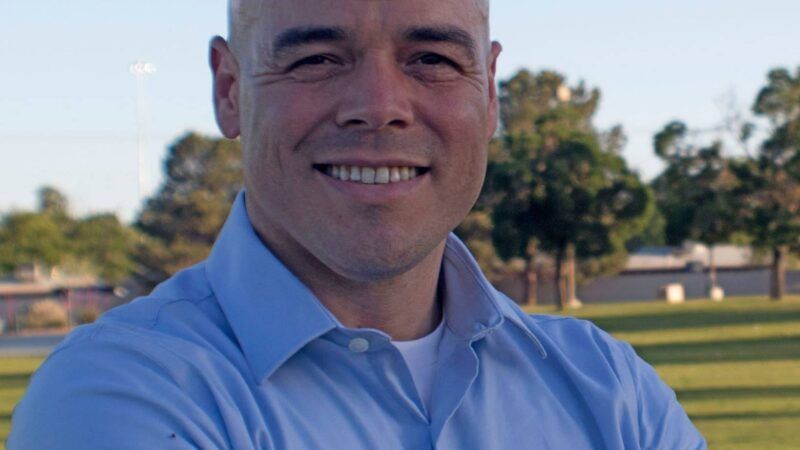Las Vegas Elected Official Robert Telles Arrested as Suspect in Journalist Jeff German's Death
Plus: The wage premium from having a college degree is falling, study finds black access to firearms reduced lynchings during Jim Crow, and more...

Reporter was "pursuing a potential follow-up story" after earlier negative reporting on the official. An elected official in Las Vegas has been arrested in conjunction with the murder of Las Vegas Review-Journal investigative reporter Jeff German, who was stabbed to death outside of his Las Vegas home last weekend.
A longtime reporter for the Review-Journal, German had "made a career of breaking big stories about everything from organized crime and government malfeasance to political scandals," as the paper describes it.
One of the subjects of German's reporting was Clark County Public Administrator Robert Telles, who has now been arrested as a suspect in German's death.
The public administrator's office was "mired in turmoil and internal dissension," wrote German in May. "A half-dozen current and former employees interviewed by the Review-Journal are alleging the hostile work environment was fueled by the elected administrator of the office, Robert Telles, carrying on an 'inappropriate relationship' with a staffer that has harmed the office's ability to deal with the public in overseeing the estates of those who have died."
Telles, a Democrat, went on to lose his primary race for public administrator in June. His current term ends January 2023.
In a June letter posted to his campaign website, Telles "attacked the Review-Journal and its reporting and claimed the allegations against [him] were false," German reported at the time. The letter "also leveled what the employees allege was a threat to retaliate against them for stepping forward."
Telles lashed out at German on Twitter, too:
https://twitter.com/RobTellesLV/status/1537834502315073537
Former Public Administrator John Cahill told German in June that Telles was "ethically challenged."
On Wednesday, the Review-Journal's executive editor, Glenn Cook, said the paper's staff were "relieved Robert Telles is in custody and outraged that a colleague appears to have been killed for reporting on an elected official."
German worked at the Review-Journal since 2010, coming there after two decades with the Las Vegas Sun.
At the time of his death, German "was pursuing a potential follow-up story about Telles in the weeks before he was killed," the Review-Journal reported today.
Telles' arrest came after police asked the public for help in identifying German's killer. "Police on Tuesday showed a brief video of a possible suspect walking on a sidewalk clad in bright orange 'construction attire' and distributed a photo of a distinctive red or maroon GMC Yukon Denali SUV with chrome handles, a sunroof and a luggage rack, saying it may have been linked to the case," notes the Associated Press. "Telles was seen in newspaper photos washing a similar vehicle parked in his driveway on Tuesday, and KTNV-TV reported the vehicle was towed away after police arrived on Wednesday."
FREE MINDS
The wage premium from having a college degree is falling:
The college wage premium has *falllen* over the last two years, as my new work with David Autor shows. Here is a sneak peek.
Cc @jasonfurman pic.twitter.com/PoHrYabzEI— Arin Dube (@arindube) August 27, 2022
FREE MARKETS
A new paper looks at how access to guns helped decrease violence against black Americans in the Jim Crow south. The paper—to be published in an upcoming issue of the Journal of Law and Economics—comes from Mike Makowsky and Patrick Warren, two associate professors of economics at Clemson University. "Greater access to firearms in the Black community reduced the rate of lynching in the Jim Crow South," Makowsky summed up the results on Twitter. "In a context where you are excluded from the institutions of governance and public safety, where terrorism against you is condoned, the tools of self-defense matter."
"The more subtle result, though, is this: public policy and law is about more than the words on paper. It's about the institutions and mechanisms of enforcement," Makowsky added. "Firearms restrictions, from the 19th and early 20th centuries, were designed for Black disarmament, but they weren't *written* for Black disarmament. They didn't have to be. They understood that the enforcement institutions would ensure the laws would work as intended."
"When advocating, designing, and voting for public policies, we would do well to consider the prospect [of] unintended [consequences] created by the *precise intentions* of those enforcing them," he concluded.
QUICK HITS
BREAKING: US District Judge Reed O'Connor in Texas rules that requiring employers to provide coverage for PrEP drugs (preventing the transmission of HIV) violates the religious rights of employers under federal law (RFRA). pic.twitter.com/d85C3izqSF
— Chris "Law Dork" Geidner (@chrisgeidner) September 7, 2022
• More on the PrEP decision here, from Reason's Stephanie Slade.


Show Comments (369)